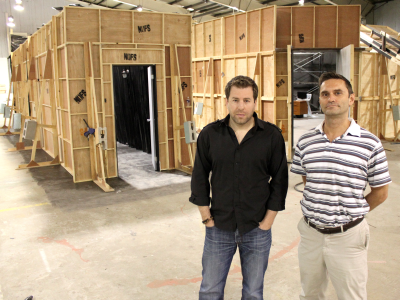Northern Ontario Film Studios won’t officially open until later this fall, but try telling that to the crew filming Dark Rising: Warrior of Worlds there.
The crew has spent a chunk of its summer shooting the sci-fi TV series in the former Sudbury hockey barn, which has been transformed into a 20,000-square-foot production studio for screen-based media, including film, TV and web applications.
“We’re still in renos,” explained David Anselmo, who set up Northern Ontario Film Studios earlier this year with his partner Pierre Bonhomme. “The opportunity presented itself where a film needed a home to shoot out of and we thought, ‘What a great idea to have a film come up here, use our facility and allow us to iron out the kinks of a 40-year-old building.’”
Former changerooms have found new purpose as a green room, production offices, a makeup and hair room, and dressing rooms. Where once skaters glided across sheets of ice, sets have been constructed and lighting rigged up. But vestiges of the facility’s former life as Barry Downe Arena linger; hockey boards cover the walls, benches have been repurposed as baseboards, and the 1970s-era canteen sign still lights up.
The Sudbury that’s proving an alluring location for major film productions is nearly unrecognizable from the mining town where Anselmo and Bonhomme were born and raised. Each identified film as an early passion, but had to move elsewhere to follow his interest. When the two decided to partner up on the production company Hideaway Pictures, an entity separate from Northern Ontario Film Studios, their goal was twofold: move back home after years of living abroad and help build up Sudbury’s burgeoning film industry.
The Northern Ontario film industry has been able to attract film productions largely because of regional incentives, but the area’s unique qualities also make it an enticing location.
“We’ve got this beautiful wilderness, but then we also have this really gritty, urban industrial stuff that they love, and it’s very cinematic,” Bonhomme said. “So you can actually shoot Northern Ontario as many, many places.”
Yet, many filmmakers view Sudbury as a transient filming location, shooting footage here and then doing the production elsewhere. To prevent that value-added business from leaving the city, Anselmo and Bonhomme are proposing to set up the infrastructure—studios, equipment and training opportunities—needed to continue the work here.
The benefits of the film industry are significant, Anselmo said. Every $1 million spent in the community results in 25 full-time spinoff jobs, and it employs a significant number of young people, keeping them in the North.
“The film industry really makes an impact on a community it shoots in,” Anselmo said. “Studies have shown that for every dollar spent in a community, we see an economic multiplier of three times. And it touches all facets of the community, from catering and food to hotels to car rentals to building supplies.”
Barry Downe Arena is a temporary location for the studio; Anselmo and Bonhomme are currently hunting for land on which to build a brand-new sound stage. In the meantime, they will welcome production crews through its doors as long as they need the space.
The partners compare their business plan to that used to develop the mining industry, which established its own, much-heralded cluster, and is still enjoying its success. They’d like to build up a media cluster that would provide all the tools needed by people to work or train in the media-related industry.
It would provide Sudbury with another industry, attract more business to the North, and allow youth who dream of working in the film industry to stay at home to perfect their craft.
“If you wanted to be a director, it used to be you’d have to go to Toronto,” Bonhomme said. “Now you can actually work as a crew person and write at home on the weekends and you might, potentially, realistically in five years, actually have a generated project from here.”




